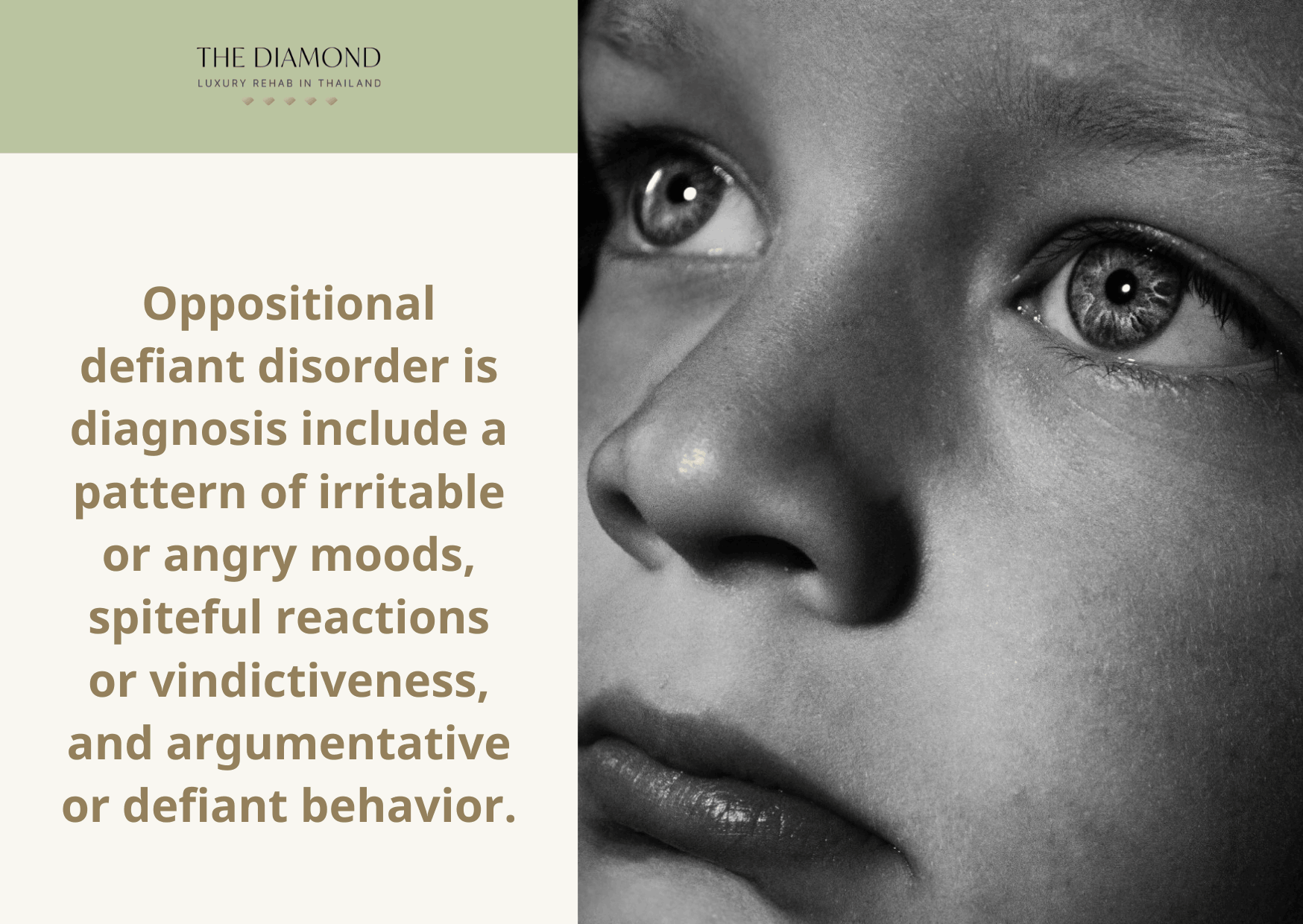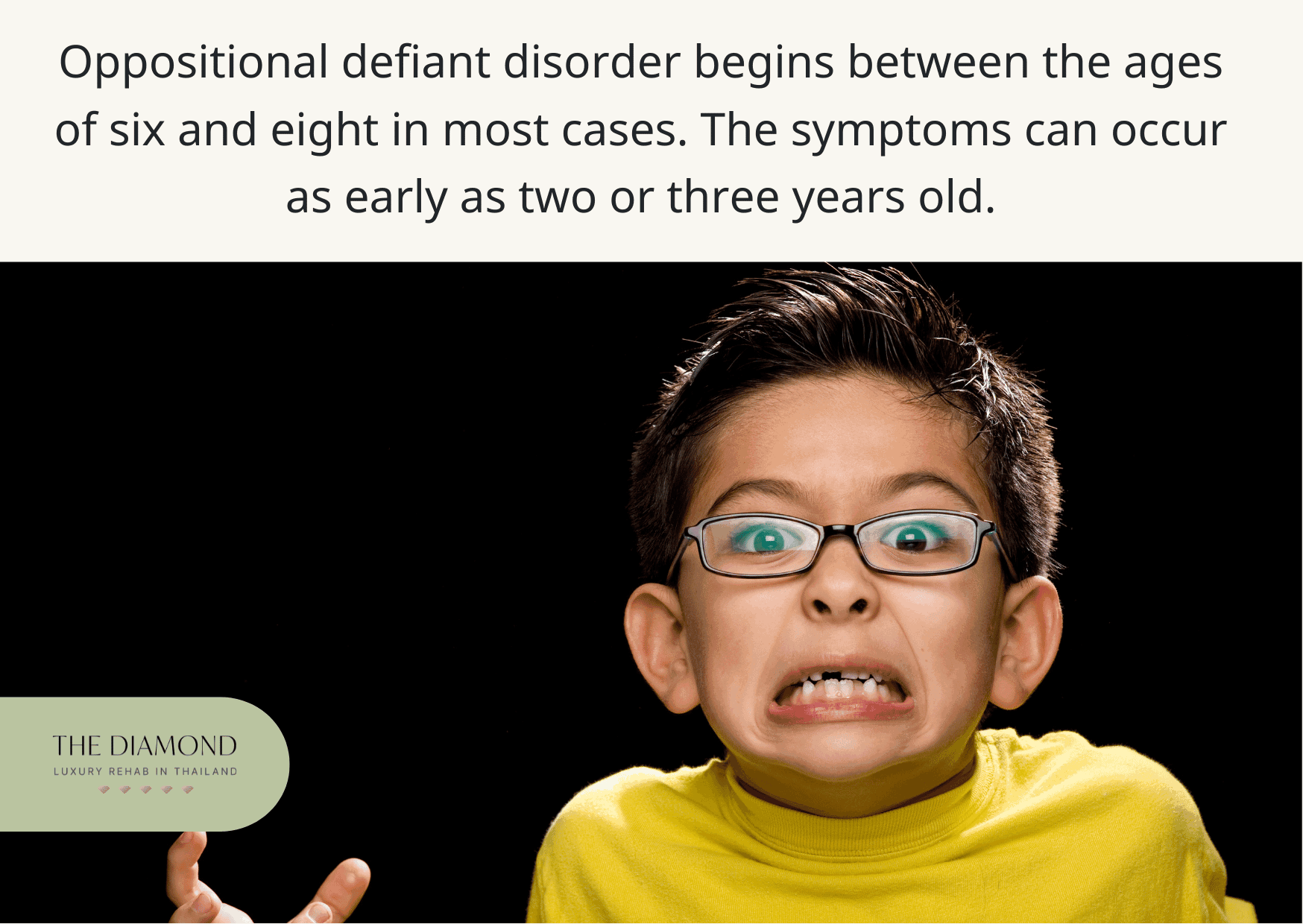Oppositional defiant disorder (ODD)
Table of content
- What is Oppositional defiant disorder (ODD)?
- What are the symptoms of Oppositional defiant disorder (ODD)?
- What are the causes of Oppositional defiant disorder (ODD)?
- What are the risk factors for Oppositional defiant disorder (ODD)?
- How Is Oppositional defiant disorder (ODD) diagnosed?
- When does Oppositional defiant disorder (ODD) begin?
- What is the prevalence of oppositional defiant disorder?
- Which children are at risk for ODD?
- What is the treatment for ODD in children?
- What is the difference between ODD and ADHD?

Oppositional defiant disorder (ODD) is a type of behavior disorder characterized by a persistent pattern of angry or irritable mood and defiant behavior. The condition usually affects children or teens.
The main symptoms of ODD are aggressive, irritable, defiant, and vindictive behavior. Patients with ODD are reluctant to obey their parents or other authority figures. They may also purposely be aggressive toward their peers.
The exact causes of ODD are unknown, but environment and genetics could be to blame. A child with this disorder doesn’t know how to process their emotions adequately or cope with certain situations. As a result, they act out.
Early ODD treatment is necessary to prevent complications that affect a patient and their family. Oppositional defiant disorder treatments revolve around therapy options that enable children to communicate and express their emotions more effectively. Since parenting approaches also contribute to the development and severity of ODD, most treatment plans are parent-centric.
What is Oppositional defiant disorder (ODD)?
Oppositional defiant disorder (ODD) is a behavior disorder wherein a child or adolescent exhibits a persistent or frequent pattern of irritability, anger, vindictiveness, and defiance toward parents or problems with authority figures.
This disorder has been recognized by the American Psychiatric Association for several decades. It first appeared in the revised third edition of the Diagnostic and Statistical Manual of Mental Disorders (DSM-3) in 1987. Before that, DSM-3 used the term oppositional disorder (OD) in its original version published in 1980. It’s useful to mention the current DSM, i.e. DSM-5, also includes oppositional defiant disorder as well as criteria for diagnosis.
Oppositional defiant disorder is a type of childhood disruptive behavior disorder that usually includes problems with self-control regarding emotions and behaviors.
What are the symptoms of Oppositional defiant disorder (ODD)?
The main symptoms of oppositional defiant disorder are angry or irritable mood, argumentative or defiant behavior, and vindictiveness. A person with this disorder loses temper tantrums and is restless or easily annoyed. They may also deliberately annoy others, refuse to comply with rules or authority figures, and blame others for their mistakes.
This disorder has a major impact on a person’s daily life. After all, a person with ODD lacks the coping skills necessary to respond adequately to a given request, challenge, or task. As a result, they tend to act out by expressing their frustration negatively or in a hostile manner. Behavioral problems and angry outbursts also jeopardize their work, school, and even family relationships and dynamics. In turn, individuals with ODD may take their defiant behavior to the extreme.
The exact symptoms and their severity vary from one person to another. The severity of symptoms is observed through the settings in which they are manifested. Patients with ODD can manifest their symptoms at home, school, or work, with their peers.
When symptoms are confined to one setting or situation only, they’re considered mild. Moderate symptoms are present in at least two settings. Symptoms present in a minimum of three settings indicate severe ODD, according to DSM-5. The disorder may manifest itself slightly differently across different age groups.
For example, children with ODD have frequent temper tantrums and argue a lot with adults, according to Cedars Sinai Medical Center, a teaching hospital and multi-specialty academic health science center in Los Angeles. A child with ODD may also refuse to do what an adult asks or questions and refuse to follow the rules. They may also deliberately do something to annoy other children and adults or blame others for their misbehavior.
Children with oppositional defiant disorder often have an angry attitude and speak unkindly or harshly. Also, they tend to be vindictive or seek revenge.
Adolescents with ODD also display angry outbursts, and they tend to be argumentative and uncooperative. Moreover, teens with this disorder are purposely antagonistic and hostile. They are also irritable, defiant, spiteful, stubborn, vindictive, and verbally aggressive. Oppositional defiant disorder in adults also exhibits these symptoms.

What are the causes of Oppositional defiant disorder (ODD)?
The exact causes of oppositional defiant disorder are still unknown and complex in research. That said, genetic, environmental, and psychosocial factors may contribute to the development of ODD, as Dr. Raman Marwaha of Case Western Reserve University School of Medicine and Dr. Arpit Aggarwal of University of Missouri specified in a chapter about Oppositional Defiant Disorder of StatPearls in 2022.
In some cases, a child’s temperament is due to neurological differences i.e., their brain and nerves function differently. Environmental factors that contribute to the development of ODD include problems with parenting such as harsh or inconsistent discipline, lack of supervision, and neglect or abuse.
A series of issues could contribute to the onset of oppositional defiant disorder. These primarily include developmental stages and learned behaviors such as the negative and toxic environment.
Some children don’t learn to be independent of their parents (or both), which makes them more likely to develop ODD due to attachment issues. This happens because all children go through emotional phases. They grow and develop emotionally by successfully resolving those stages. But, attachment issues could prevent some children from processing their emotions adequately. As a result, a child becomes a defiant person. A 2016 analysis published in the Journal of Developmental and Life-Course Criminology by Jennifer Theule et al. of the University of Manitoba in Canada found that attachment issues are predominant among people with ODD, and most people with ODD exhibit insecure attachment.

What are the risk factors for Oppositional defiant disorder (ODD)?
- Gender: before the adolescent years, boys are more likely to develop ODD than girls. The difference diminishes by adolescence.
- Temperament: a child with temperament including difficulty regulating emotions is at a higher risk of oppositional defiant disorder. A 2022 systematic review published in the International Journal of Environmental Research and Public Health by researchers and professors led by Xiuyun Lin expounded that a child with impaired emotion regulation competencies is at greater risk of developing ODD symptoms. Developing emotion regulation is critical in a child’s early development. Consistently failing to handle negative emotions overwhelms a child with distress and frustration. This exposes them to the risk of developing psychopathology and experiencing maladaptive outcomes.
- Family discord: children brought up in a hostile, aggressive, and dysfunctional environment may develop behavioral issues and become more likely to get ODD. Factors such as single parenthood, family conflict, dissolution or divorce, and poverty contribute to a child’s disruptive behaviors during childhood development, as emphasized by Abhishek Ghosh et al. of the Postgraduate Institute of Medical Education and Research in India in a 2017 article published in the Psychology Research and Behavior Management.
- Parenting problems: the style of parenting may influence the child’s risk of ODD. Both overly strict and neglectful parenting can contribute to the development of this disorder. In a 2015 systematic review published in Frontiers in Psychology, professors Roser Granero, Leonie Louwaars, and Lourdes Ezpeleta of the Autonomous University of Barcelona in Spain noted that problematic early parenting behaviors such as harsh discipline, inconsistent rules, and negative emotional expression are linked to later signs of ODD.
- Exposure to violence and substance abuse: children that spend a lot of time in unhealthy and negative environments that include violence and substance abuse are more likely to develop ODD. According to a 2021 study in BMC Psychiatry by Ming-Chia Liu and Chau-Shoun Lee of the Department of Psychiatry at MacKay Memorial Hospital in Taipei, Taiwan, and Jung Chen Chang of the School of Nursing at National Taiwan University, students exposed to high-risk environments characterized by illicit substance use are more likely to exhibit ODD with implications that such exposure can be considered a risk factor for the development of ODD.
- Family history: like many other mental health disorders, ODD is more common in patients with a family history of mental illness.
- Presence of other conditions: ADHD and other mental health conditions could also pave the way to ODD. In a 2020 review published in Cureus, Psychiatrist Noha Eskander of the California Institute of Behavioral Neurosciences & Psychology emphasized that around 47% of children with ADHD have ODD. Meanwhile, research found that children who have ADHD and intellectual disability have higher risks of comorbid ODD.
Although all children can develop oppositional defiant disorder, some are at a higher risk than others. Risk factors for ODD usually revolve around:
- Unhealthy or dysfunctional environment
- Problematic parenting styles (lack of supervision or being too strict)
- Exposure to negative behaviors and activities
How Is Oppositional defiant disorder (ODD) diagnosed?
Oppositional defiant disorder is diagnosed if a patient meets the criteria described in the Diagnostic and Statistical Manual of Mental Disorders, Fifth Edition (DSM-5), of the American Psychiatric Association. These criteria include a pattern of irritable or angry moods, spiteful reactions or vindictiveness, and argumentative or defiant behavior. The aforementioned behavioral symptoms must persist for at least six months and cause notable disturbances at home, school, or work that are exhibited in interactions with at least one individual who is not a sibling.
Oppositional defiant disorder should be diagnosed through a complete psychiatric evaluation. Children and adolescents undergo evaluation involving different informants such as parents, siblings, friends, and teachers in numerous settings as illustrated by Dr. Raman Marwaha of Case Western Reserve University School of Medicine and Dr. Arpit Aggarwal of University of Missouri specified in a chapter about Oppositional Defiant Disorder of StatPearls in 2022.
Psychiatric evaluation involves assessing a child’s behavior and emotions across multiple relationships and settings, strategies that have been helpful or unhelpful in managing aggressive behaviors, and the presence of disorders involving communication with others, learning, and mental health. Aside from pyschiatric evaluation, a complete academic assessment along with intelligence testing is also necessary to reveal any intellectual difficulties or learning disorders.
When making a diagnosis, a doctor considers a patient’s age, the intensity of symptoms, and their frequency. Pediatricians may refer a child with symptoms of ODD to a child psychiatrist or mental health expert who will diagnose the condition and recommend an adequate treatment plan.
It’s useful to bear in mind that ODD may occur along with other mental health and behavioral problems, which is why its symptoms may be tricky to distinguish from those associated with other disorders. To rule out other conditions, the healthcare professional will evaluate a child’s overall health, intensity or frequency of behaviors, and family interactions and situations.
Once the oppositional defiant disorder is diagnosed, the healthcare professional recommends the most suitable treatment plan.

When does Oppositional defiant disorder (ODD) begin?
Oppositional defiant disorder begins between the ages of six and eight in most cases. The symptoms can occur as early as two or three years old.
In a 2019 study published in BMJ Open, Lourdes Ezpeleta et al. of the Autonomous University of Barcelona looked into the incidence of ODD in Spanish children from ages three to nine. The study found that the probability of developing ODD is higher in the preschool period and reduces at the beginning of childhood, then increases again when approaching puberty at the ages of eight or nine. The prevalence of ODD was between 6% and 7% between the ages of three and eight, and it jumped to 8.8% by the age of nine.
The same study also revealed that early ODD diagnosis at a young age is associated with worse mental health outcomes.

What is the prevalence of oppositional defiant disorder?
The prevalence of ODD is estimated to range from 3% to 5%. At the same time, the majority of combined ODD and conduct disorder is 6.1%, according to the Prevalence of Oppositional Defiant Disorder and Conduct Disorder chapter of the book Mental Disorders and Disabilities among Low-Income Children. Unfortunately, there is no population- or national-level data on the prevalence of ODD in the United States. Studies show that the average prevalence of ODD is around 3.3%.
A study by Matthew Nock et al. of the Department of Psychology of Harvard University published in the Journal of Child Psychology and Psychiatry, and Allied Disciplines reports that the lifetime prevalence of ODD is around 10.2%. The prevalence of ODD among males is 11.2% and 9.2% among females. Of individuals with lifetime oppositional defiant disorder, 92.4% meet the criteria for at least one other lifetime disorder such as those involving mood, anxiety, impulse control, and substance abuse.
National- and population-level statistics are necessary to determine the prevalence of ODD to raise awareness of this disorder and its true impact on a patient and their family or social circle.
Which children are at risk for ODD?
ODD is more common in boys than in girls. Additionally, the disorder is more common in children with certain mental health issues such as mood or anxiety disorders, conduct disorder, and attention deficit hyperactivity disorder (ADHD).
Oppositional defiant disorder usually stops within three years of diagnosis, according to the American Academy of Child and Adolescent Psychiatry. There is no specific age at which ODD stops, but with proper treatment, the symptoms can resolve with time.
The condition is generally diagnosed around early elementary school ages and stops being diagnosed after adolescence. By the age of 19, patients tend to have a well-established pattern of behavior. All this depends on an accurate diagnosis and an adequate treatment plan.

What is the treatment for ODD in children?
Treatment for ODD in children primarily revolves around therapy and family-based interventions which are listed below:
- Parent training: includes working with a mental health professional to help parents develop skills for more consistent, positive, and less frustrating parenting. Sometimes children participate in parent training.
- Cognitive problem-solving training: helps children identify and change negative thought patterns that contribute to behavioral problems. This training works similarly to cognitive-behavioral therapy (CBT), which allows children to learn how to control anger and impulses. A major aspect of this approach is collaborative problem-solving, wherein parents and children work together on solutions that work for everyone.
- Parent-child interaction therapy: involves the therapist coaching parents while they are interacting with children. The goal is to ensure parents adopt more effective parenting styles to decrease problematic behaviors.
- Peer group therapy: helps children be more flexible and allows them to improve their interaction with their peers.
- Individual and family therapy: enables children to learn how to express their feelings and manage their anger more healthily. Family therapy aims to improve the relationship between children and parents or other family members.
Early treatment for oppositional defiant disorder is crucial. The condition can cause complications such as poor school performance, antisocial behaviors, and impulse control problems when left untreated. Children with ODD could have difficulty at home with siblings and parents or in school with teachers and peers.
A major aspect of treatment for ODD includes managing co-occurring problems such as learning disorders. Medications are generally not used for the management of ODD unless a child has coexisting disorders such as ADHD, depression, or anxiety. In these cases, a healthcare professional could prescribe medications to manage symptoms of those conditions.
The duration of treatment for ODD varies from one child to another, but it can last several months or longer.
What is the difference between ODD and ADHD?
The main difference between ODD and attention deficit hyperactivity disorder (ADHD) is that the latter condition makes children easily disorganized and distracted. On the other hand, ODD makes children defiant and angry.
An article by Dr. Jasmine Shaikh published in Medicine Net explains that a child with ADHD may push another child impulsively and later regret their actions, meanwhile, a child with ODD could push another kid deliberately and feel great about it.
In other words, children with ADHD could disregard rules due to the inability to pay attention, whereas children with ODD can pay attention but choose not to adhere to rules or instructions.
ADHD and ODD have some similarities. For example, the exact causes of both conditions are unknown, but genetics could play a role. Both conditions are more prevalent in males. Management of both ADHD and ODD involves therapy.

